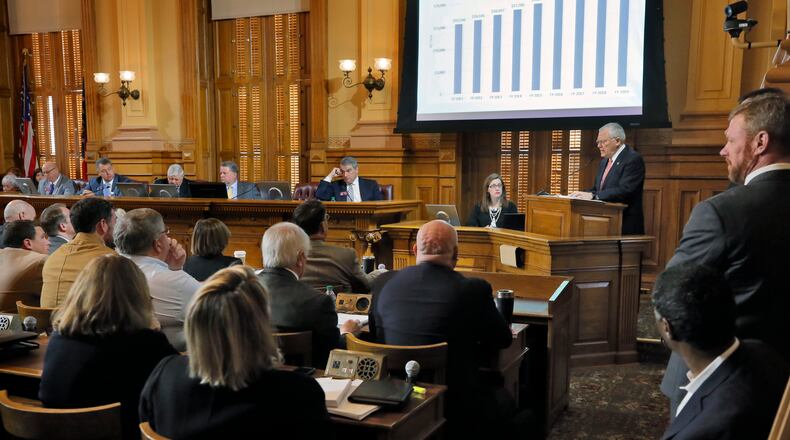Gov. Nathan Deal and the state’s chief fiscal analyst painted an optimistic picture of Georgia’s economy for legislative leaders Tuesday, although the impact of new federal tax changes remain unclear.
Ken Heaghney, Georgia’s fiscal economist, told members of the House and Senate budget committees that the state is projecting a 3.7 percent increase in revenue in fiscal 2019, which begins July 1. That’s slower growth than in 2017, but Heaghney said the projections do not take into account the impact of the federal tax changes Congress approved in December.
Heaghney said the changes — which are expected to result in smaller tax withholdings for millions of employees and tax cuts for corporations — could provide a short-term boost to the economy, but the long-term impact isn’t clear.
He said officials must go over more than 200 provisions in the new federal law to figure out how much effect it will have on the state budget, such as whether it will mean more or less revenue — tax money. Once they figure that out, Deal may have to change his revenue estimate — up or down — for the upcoming fiscal year.
“There are things in the federal bill that will impact us if we don’t do anything,” Heaghney said. “We want to give the governor a good understanding of what the implications are.”
In general, Heaghney told lawmakers Georgia is seeing continued job and wage growth, good news for the state. The current recovery from the Great Recession — which is now almost a decade old — doesn’t show signs of slowing or have obvious imbalances, such as the real estate bubble of the late 2000s, he said.
“The fundamentals are good,” he added. “That sets the stage for continued solid growth both in Georgia and the rest of the country.”
Deal told lawmakers that while he is proposing a record $26 billion budget ($50 billion including federal funds), per-capita spending by the state is on par with what it was in 2006 and 2007, before the Great Recession.
“It has taken nearly a decade for state revenues to catch back up with the rapid population growth we have seen during this period,” he said.
Deal, who leaves office next January, said his administration’s philosophy has been “budget conservatively, live within our means … invest in the long-term economic health of the state.”
A vast majority of this year's budget increase will go to propping up the finances of the teacher pension system, paying for increased enrollment in k-12 schools and colleges, and higher costs for Medicaid, the public health system for the poor, disabled and nursing home residents.
The governor said since the state’s population growth and needs in areas such as education have often outpaced revenue, the government has had to “rethink how we deliver services,” using fewer employees, employing better technology and outsourcing services.
Deal said the number of state employees — excluding the University System of Georgia — declined from 70,716 in 2008 to 58,642 in 2017.
“Our agencies have learned to do more with less,” he told lawmakers. “A budget that has gotten bigger does not necessarily equal a government that has gotten bigger.”
While there have been complaints that next year's budget proposal doesn't includes teacher raises but does have $166 million in "austerity cuts" built into every spending plan since the mid-2000s, Deal touted a $2.7 billion increase in school funding since he took office in 2011. He also said per-student spending has risen almost 32 percent during that time.
Meanwhile, Deal told lawmakers that changes he promoted in the criminal justice system dramatically slowed the projected growth in Georgia's inmate population, saving the state hundreds of millions of dollars during his tenure.
Deal and Heaghney were the lead-off speakers at two days of joint House and Senate budget hearings, which conclude Wednesday. The hearings are on an accelerated schedule this year because some leading lawmakers want an early end to the 2018 session so they can begin campaigning.
The Senate in particular wants to move the session along quickly, with Lt. Gov. Casey Cagle, the chamber’s president, and state Sen. Michael Williams, R-Cumming, raring to continue their run for governor, and state Sen. David Shafer, R-Duluth, running for lieutenant governor. Under state law, candidates such as Cagle, Williams and Shafer can’t raise money while the General Assembly is in session.
About the Author
Keep Reading
The Latest
Featured



